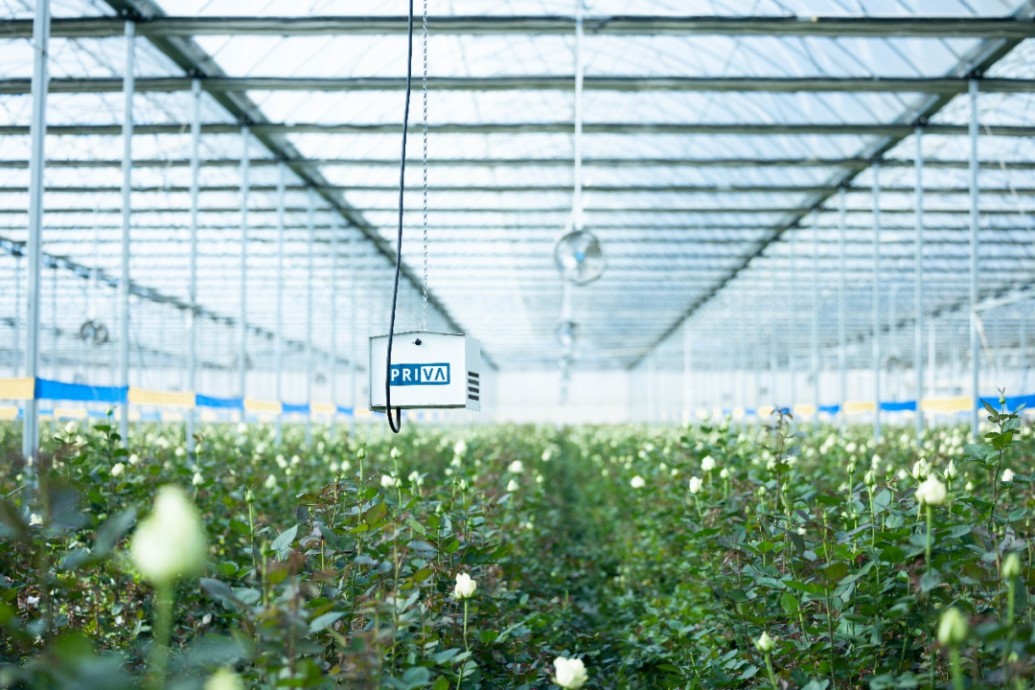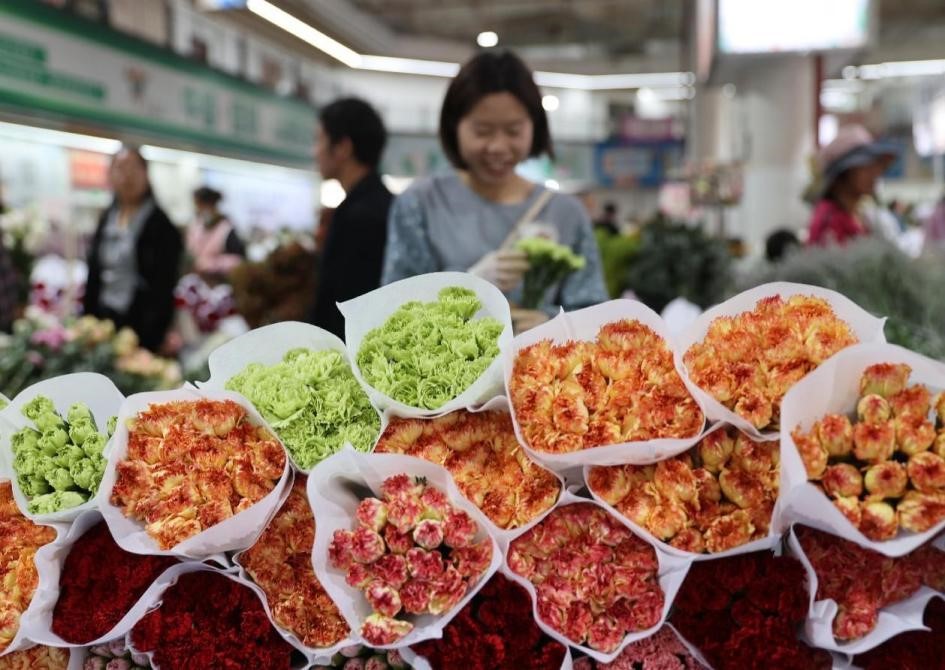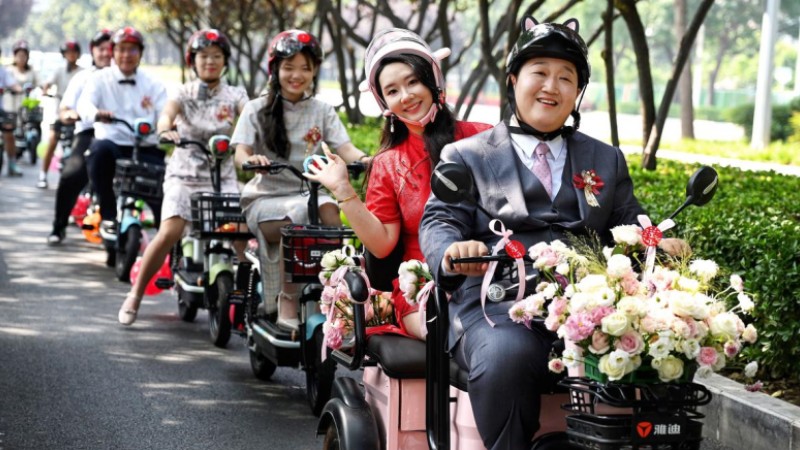Technologies powering cut flower industry in China's Yunnan
Yunnan province in southwest China is an important producer of flowers thanks to its unique natural and climatic conditions. It produces flowers all year round.
Today, technological advances have breathed new life into the cut flower industry in the province. Modern agricultural facilities allow for precise control over the flowering, and advanced cold chain logistics can enable consumers thousands of miles away to receive bouquets freshly cut from plants within 48 hours.
Yunnan has built a complete industrial chain of cut flowers, including a flower trading market and a distribution system that serve not only China, but also the rest of Asia. The province produces 18 billion stems of cut flowers annually, and ranks first in China in terms of cut flower production and sales for 28 consecutive years.

Photo shows a greenhouse at a demonstration park for modern floriculture in Kunming, capital of Yunnan province. The park is managed by Yuntianhua, a company engaged in the manufacturing and selling of chemical products. (Photo from Yuntianhua)
At 9 a.m., endless rows of roses were growing vigorously at a demonstration garden for modern floriculture in Kunming, capital of Yunnan province. The park was managed by Yuntianhua, a company engaged in the manufacturing and selling of chemical products.
The massive greenhouses here have intricate networks of pipes and equipment. Picking up an irrigation tube from a flower planting tray, Lyu Jinlong, the operations director of a Yuntianhua subsidiary, told that the tube is over 100 meters long and can feed the flowers with water-fertilizer mixture from more than 500 separate outlets at the same time.
"We collect environmental data and flower growth information using sensors installed in the greenhouses, which will then guide an integrated water-fertilizer system to blend water-fertilizer mixtures in different ratios," Lyu noted, adding that the fluids are applied directly to the roots of the flowers.
There are plenty of other high technologies inside the greenhouses, including adjustable roof panels that can control lighting intensity, films that can form diffused light, decay-resistant coconut husks for soilless cultivation and heating pipes that can regulate interior temperature and humidity.
Lyu said the company makes agricultural products with an industrialized approach, using computers for high-precision control over the greenhouse environment to achieve automated and intelligent production. This allows the company to grow plants in optimal conditions with less energy and fertilizer, he noted.
According to Lyu, with this system, daily water and fertilizer management for 107 mu (7.13 hectares) of flowers can be handled by just one person.
It is learned that under the intelligent planting mode, the quality and yield of flowers have been greatly improved. The rose yield per mu is 30,000 to 50,000 stems under traditional cultivation methods, while intelligent reforms have increased this number to 140,000 stems.

Photo shows the auction hall of the Kunming International Flora Auction Trading Center, southwest China's Yunnan province. (Photo from Dushi Shibao)
At 1 p.m., the auction hall of the Kunming International Flora Auction Trading Center (KIFA) was filled with people. All of its over 900 seats were occupied.
On a huge electronic screen in the front of the hall, real-time auction information was displayed, including varieties, grades, flaws and more information about the flowers. Nearly 1,000 flower brokers were concentrating on the information, getting ready to bid for their pre-selected flowers.
On average, a deal was made every four seconds. The intense and lively auction hall seemed like a stock exchange trading floor.
Flower brokers serve as a bridge between flower suppliers and source markets. They distribute flowers to regions across China after the auction.
About 5 to 6 million stems of cut flowers are up for auction every day, with transaction values exceeding 4.5 million yuan ($625,495), and all the flowers are evaluated by the KIFA with open and transparent prices, said Zhu Qi, who is in charge of planning at the KIFA.
Over 3,000 varieties of cut flowers under some 40 categories are entering the domestic market and more than 40 other countries and regions including Thailand, Japan, Singapore and Australia, according to Zhu.

Photo shows flowers at the Kunming Dounan Flower Market in Kunming, southwest China's Yunnan province. (People's Daily Online/Liang Zhiqiang)
The Kunming Dounan Flower Market where the KIFA is located is China's only national-level flower market. In 2022, its trading volume reached nearly 11.04 billion stems, with a total transaction value of more than 12.14 billion yuan. At least seven out of every 10 stems of cut flowers in the Chinese market come from the Dounan market.
In the market, flower trading is conducted mainly through face-to-face transactions, auctions, and e-commerce. Traditional face-to-face transactions account for around 70 percent of the total.
"In the past, due to underdeveloped land-based cold chain logistics network, 90 percent of the flowers were shipped by air from the market, resulting in high logistics costs that drove up flower retail prices," said Qian Chongjun, executive president of Dounan Flower.
Now, with the joint efforts of many parties, cold chain logistics systems have gone through accelerated development. Over 200 logistics companies have entered the Dounan market. Today, more than 80 percent of flowers are shipped via land-based cold chain logistics networks from the market, which significantly reduces logistics costs, Qian said.
The Yunnan branch of SF Express is a major carrier for fresh flower logistics in the market. Zhu Li'na, customer manager of the company's sales department, said that flowers shipped by air can reach 146 cities within 24 hours, and 310 cities within 48 hours.
With regard to land transportation, SF Express has set up a daily refrigerated train line. Additionally, it also operates over 100 refrigerated trucks and 18 cold chain routes to ensure flower delivery, which are able to send flowers to 267 cities within 48 hours.
Photos
Related Stories
- Indochinese gray langurs spotted in SW China's Yunnan
- Villager digs up 3.2 kg wild fungus in SW China's Yunnan
- A glimpse of Culture and Tourism Pavilion at 7th China-South Asia Expo
- In pics: blooming buckwheat flowers in Yanchi County, NW China's Ningxia
- Sri Lankan expert cultivates mushroom passion in Yunnan
Copyright © 2023 People's Daily Online. All Rights Reserved.









